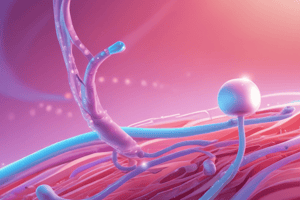Podcast
Questions and Answers
What is the primary mechanism through which the intrauterine system (IUS) prevents pregnancy?
What is the primary mechanism through which the intrauterine system (IUS) prevents pregnancy?
- Thickening of cervical mucus only
- Blocking the release of eggs from the ovaries
- Reducing sperm migration and successful implantation (correct)
- Inhibition of ovulation in all women
What is the failure rate of the IUS during the first year of use?
What is the failure rate of the IUS during the first year of use?
- 0.5%
- 2%
- 0.2% (correct)
- 1.5%
Which of the following is a non-contraceptive benefit of the 52 mg LNG-IUS?
Which of the following is a non-contraceptive benefit of the 52 mg LNG-IUS?
- Enhancement of ovulation
- Cessation of menstrual bleeding (correct)
- Increase in menstrual flow
- Prevention of pregnancy
Women with which condition should generally avoid using the IUS?
Women with which condition should generally avoid using the IUS?
How does the IUS primarily reduce dysmenorrhoea in women?
How does the IUS primarily reduce dysmenorrhoea in women?
What is one of the common gynaecological conditions that may be treated with an IUS?
What is one of the common gynaecological conditions that may be treated with an IUS?
After one year of using the 52 mg LNG-IUS, what percentage of women may experience amenorrhoea?
After one year of using the 52 mg LNG-IUS, what percentage of women may experience amenorrhoea?
Which of the following is NOT a potential indication for using the IUS?
Which of the following is NOT a potential indication for using the IUS?
What is the typical use failure rate of an IUD as a contraceptive method?
What is the typical use failure rate of an IUD as a contraceptive method?
What is the minimum recommended copper surface area for effective contraceptive action of an IUD?
What is the minimum recommended copper surface area for effective contraceptive action of an IUD?
Which of the following describes the action of copper in a copper IUD?
Which of the following describes the action of copper in a copper IUD?
How long can an IUD be retained in individuals over 40 years of age?
How long can an IUD be retained in individuals over 40 years of age?
What potential health benefit does an IUD provide apart from contraception?
What potential health benefit does an IUD provide apart from contraception?
What is one of the possible side effects after IUD insertion?
What is one of the possible side effects after IUD insertion?
When can an IUD be used as emergency postcoital contraception?
When can an IUD be used as emergency postcoital contraception?
What is the main reason for using a non-hormonal method like an IUD?
What is the main reason for using a non-hormonal method like an IUD?
Flashcards are hidden until you start studying
Study Notes
Intrauterine Contraceptives
- Multiple brands of copper intrauterine devices (IUDs) are available in the UK, primarily T-shaped, with a minimum recommended copper surface area of 380 mm² for efficacy.
- IUDs function via pre- and post-fertilization mechanisms, effective for both emergency contraception and ongoing use.
- Copper IUDs alter cervical mucus, impair sperm passage, and exhibit toxicity to sperm and ova, preventing fertilization.
- They also affect the endometrium, inhibiting implantation of a fertilized ovum.
- Most IUDs are licensed for use for five to ten years, with extended use permitted for individuals over age 40 until menopause.
- Failure rates: typical use is around 0.8%, while perfect use is approximately 0.6%. Immediate efficacy post-insertion; suitable for emergency contraception if inserted within 120 hours of unprotected intercourse or 5 days of expected ovulation.
Contraindications and Benefits
- Contraindications for copper IUDs exist, reducing risks of endometrial and ovarian cancers.
- IUDs are beneficial for those unable or unwilling to use hormone-based contraceptives due to contraindications or side effects.
- Side effects may include heavier or more painful menses, with one-third of women discontinuing use within 6 months primarily due to pain management challenges.
Intrauterine System (IUS)
- IUS is a T-shaped device releasing progestogen, levonorgestrel, directly into the uterus.
- Various IUS models are available with different levonorgestrel doses and durations of use.
- Contraceptive action arises from progestogenic effects on the endometrium and cervical mucus, which impair sperm migration and implantation; about 75% of users continue to ovulate.
- The IUS has a failure rate of around 0.2% during the first year and is a non-user dependent method of contraception.
Non-contraceptive Benefits and Indications
- Significant reduction or cessation of menstrual bleeding is common, with up to 50% experiencing amenorrhea after one year of using the 52 mg LNG-IUS.
- It is an effective treatment for heavy menstrual bleeding and can prevent iron-deficiency anemia associated with this condition.
- The IUS can alleviate dysmenorrhea and pain linked to endometriosis and may be combined with high-dose estrogen to treat premenstrual syndrome.
- It effectively prevents and reverses histological and symptomatic endometrial hyperplasia, often outperforming oral progestogens.
- Very few contraindications exist for the IUS; however, it should be avoided in women currently diagnosed with breast cancer, and specialist advice is needed for previous cases or liver conditions.
Studying That Suits You
Use AI to generate personalized quizzes and flashcards to suit your learning preferences.




